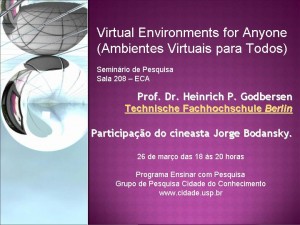Graduated in Electric Engineering and Computer Science, Professor Heinrich Godbersen defends an open, low-cost immersive and creative design to explore the applications of audiovisual technologies in the realm of 3D and virtual worlds. The subject has grown in importance in international events in Asia and EU – in 2008, immersion in 3 or more dimensions is the direction to go”, according to Gilson Schwartz, promoter of the March, 26th workshop which focused on audiovisual assets and digital technology for 3D rendering in Germany.
“I was working along with moviemaker Jorge Bodanzky in the development of new immersive digital media platforms for projects in the Amazon region, especially Second Life, when he made contact with Godbersen, after reading about his work in German media (Der Spiegel). “My activity involves the Amazon Forest, the passion for the documentary and the impulse to take the audiovisual into new narrative possibilities, with an amplified potential for creation in new digital medias”, explained Bodanzky.
The workshop was the first public lecture of the free discipline “Introduction to Iconomics” offered by the Dept. of Film, Radio and TV to students from Engineering, Computer Science, Economics and Business Administration as well as from the School of Communication and Arts by the coordinator of the City of Knowledge research group, Gilson Schwartz. Prof. Heinrich Godbersen (Technical School-University, University of Applied Science of Berlin) presented his findings and research with students, advocating “Virtual Environments for Everyone”.
“Working with the third dimension is at the crossroads of the research frontier with respect to the evolution, innovation and production of contemporary audiovisual projects and the diversity of perspectives on the advance of virtual reality are really promising” according to Godbersen, that goes further to say that “it is possible that any project in this field of research can be executed using modular software, already available at stores and with low cost when directed to projects in universities.” These are projects made to help creative minds, not to create complex and expensive systems that require more computer knowledge than creativity. “Complexity will come about with time and learning” affirms Godbersen, who saw the semestral work of one of his students win the European Prize German language countries against 200 other projects: he designed a virtual orchestra with celphones.
The main point is to be persistent, as results will demand new software and graphic design skills that should not exceed 20% of the project, affirms Godbersen.
One of the examples presented is a Panorama, like those of the Old Cinema age, but with an interactive interface .The controller could role-play any character, defined by himself, and explore existing environments in real-time.
Another project involves the gaming field: a live challenge between a rally racer and a videogame, away from the race; or the dangerous navigation through the Amazon River on a surfboard at full speed. Another project has been made available for the European public – wings are manipulated by the user, flying over an urban environment such as Vienna, turning mankind’s most ancient dream into the reality of a virtual flight. In the area of health, a customized model of the patient’s nose, on which a doctor could identify the best aesthetic correction to be applied, was developed using Godbersen´s low cost setup.
It is possible to create virtual environments with low-budget softwares ,digital 3D assets like environments available on the web that can be digitally transposed by software manipulation, aggregating characters, virtual images and objects developed by other people, interactions with the real world, through body scanners .”It is not about unauthorized copying for commercial purposes, but to make good use in the academic sphere while creating possibilities for later commercial applications”, stresses Godbersen, claiming that all the digital assets integrated into his projects are fully compliant with intellectual property rights.
The event had a massive presence of undergraduate and graduate students, as well as a live transmission through USP’s IPTV. The event integrates the activities of the City of Knowledge research group in 2009, part of the “Ensinar com Pesquisa” (Learning from Research) program, endorsed by the “Pró-Reitoria de Pesquisa da USP” (Research Pro-Recotrate), the PRO-IDEAL consortium, sponsored by the European Commission to promote the dialogue on information and communication technologies between the European Union and Latin America.
Ezequiel de Souza G. Pordeus
Bolsista Ensinar Com Pesquisa, Pró-Reitoria de Pesquisa – USP
(Translation: Pedro F. A. Schwartz)


Deixar Um Comentário
Você precisa estar logado para postar um comentário.